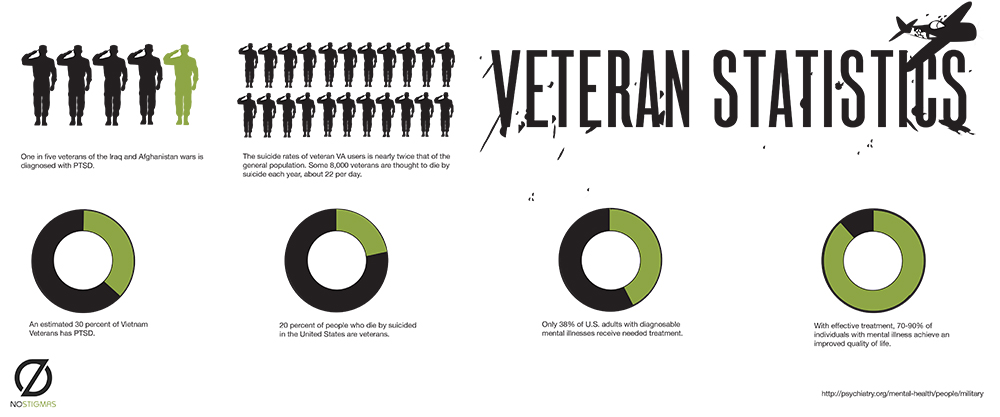Mental Health and the Military
Post-traumatic stress disorder is not the only mental health issue among military veterans and active personnel. What are some other mental health problems and how can we help?
Although post-traumatic stress disorder (PTSD) is one of the most prevalent mental health problems among the military veterans and active personnel, it is certainly not the only problem that these heroes can face. PTSD has physical and psychological symptoms such as depression, substance abuse, troubles with memory and cognition, and other physical and mental health problems. PTSD most often occurs after life-threatening event such as military combat, natural disasters, terrorist incidents, serious accidents, or violent personal assaults. People suffering from PTSD can face nightmares, flashbacks, sleeping disruption/having trouble going to sleep, and feel emotionally numb.
- Depression, substance abuse, and anxiety disorders are the most common disorders among the UK armed forces after post-deployment.
- Depression can be defined as sadness, irritability, or low energy. Some symptoms can include having trouble doing everyday tasks or problems in relationship. In the military, depression can be especially troubling if they have lost someone close to them or someone who was in their unit.
- Substance abuse is overindulging or dependence on alcohol or drugs and people who serve in the military are not immune to substance abuse because they face many hardships such as the stress of deployment after a war has ended.
- Anxiety disorders are ways to cope with stress; however, if the anxiety becomes excessive, does not fit the situation, or lasts for long periods of time it can interfere with everyday activities or your relationships with other people.
Reserves veterans are at the greatest risk for these mental health problems, as they do not have as many resources to treat disorders as the regular military does. However, international recognition has greatly increased for “post-conflict dysfunction” within the military and within civilian society. PTSD in ex-service personnel is included in post-conflict dysfunction among other disorders.
Mental Health and Veterans
In regards to the military population, people who have mental health problems are more likely to leave their service prematurely, experience lost work days, and become socially excluded. Evidence suggests that there is a small, but important minority of veterans who leave the service with mental health problems, remain chronically unwell, and are vulnerable to social exclusion, such as a marital breakdown, unemployment, and homelessness.
As shown in recent large-scale studies, the most common mental health problems within veterans after deployment from the Gulf War are depression, anxiety disorders and alcohol misuse/dependence.
The most common mental health problems among veterans include (in order of prevalence):
- Adjustment disorders
- Substance abuse
- Depressive disorders
- Personality disorders
- Post-traumatic stress disorder
Adjustment disorder symptoms among veterans and active personnel can be sadness, anxiety or feelings of being upset after a life changing or traumatic event such as serving in the military during wartime. The US military veterans’ claims for PTSD have greatly increased as the reported cases was 120,265 in 1999, but now have reached 215,871 cases in 2004. Findings from the NVVRS suggest that there are 18.7% symptoms of PTSD in veterans for lifetime prevalence and 15.2% for 12 years after the war. However, the trajectory of most of the veterans suggests that even those with the most severe symptoms have made improvements in their symptoms or in their remission.
With the total costs of treating PTSD drastically rising from Vietnam, veterans are now claiming for “delayed” PTSD. Therefore, PTSD in veterans has become a significant public health problem. There are about 94% of veterans who are seeking mental health concurrently applying for PTSD disability benefits. As far as Iraq and Afghanistan, recent research has shown that there appears to be mental health burdens for those who have served there as well.
Veterans and active personnel see a lot as they are serving for their country. Whether they are in combat or not, they often witness fellow members get injured or go through near death experiences. It is a lot for a person to go through alone and this is why we need to be here for them. Military members and their families can reach out to their “network of care”, which can include their primary care physician, religious leader, or friends and family. By talking about what they are going through they can receive further help or just talking about it can relieve them of their pain, stress, or anxiety.
There are many resources available to help both veterans and active personnel to become familiar with mental health issues involving with serving in the war zone and what symptoms may occur. For further information, please visit the following links:


